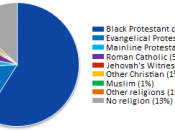I feel that Ebonics should not be recognized as a new language, because it derives mostly from English, and has features that resemble the Standard English. Before I discuss why Ebonics simply is a dialect, I would like to reassure what the definitions of 'language' and 'dialect' are. Language is a "Communication of thoughts and feelings through a system of arbitrary signals used by a nation, people, or other distinct community," while dialect means, "A regional or social variety of a language distinguished by pronunciation, grammar, or vocabulary, especially a variety of speech differing from the standard literary language or speech pattern of the culture in which it exists." These definitions tell us that Ebonics has more vernacular elements than linguistic.
Ebonics derives from many different cultures, such as African, English, and American; but most of it is composed of Standard English and followed by Standard English rules. That is why even some people who do not have much knowledge about Ebonics still can understand quite well when they hear it.
Just because Ebonics is very hard to understand by many non-African Americans and it has some different Phonemes, does not mean it can become a language. In other countries, in Korea for instance, also have several different kinds of dialects. All of the dialects in Korea have different tones, pronunciations, and accents. They do not have a unified grammar, and are often abbreviated from the Standard Korean; therefore, many people who speak Standard Korean have hard times understanding dialects. However, they are never considered as 'languages,' because only part of the whole Korean population uses it. Thus, the Standard Korean is taught in all of the schools in Korea. The situation with Ebonics is the same. It is used by a one of the major population of the...


